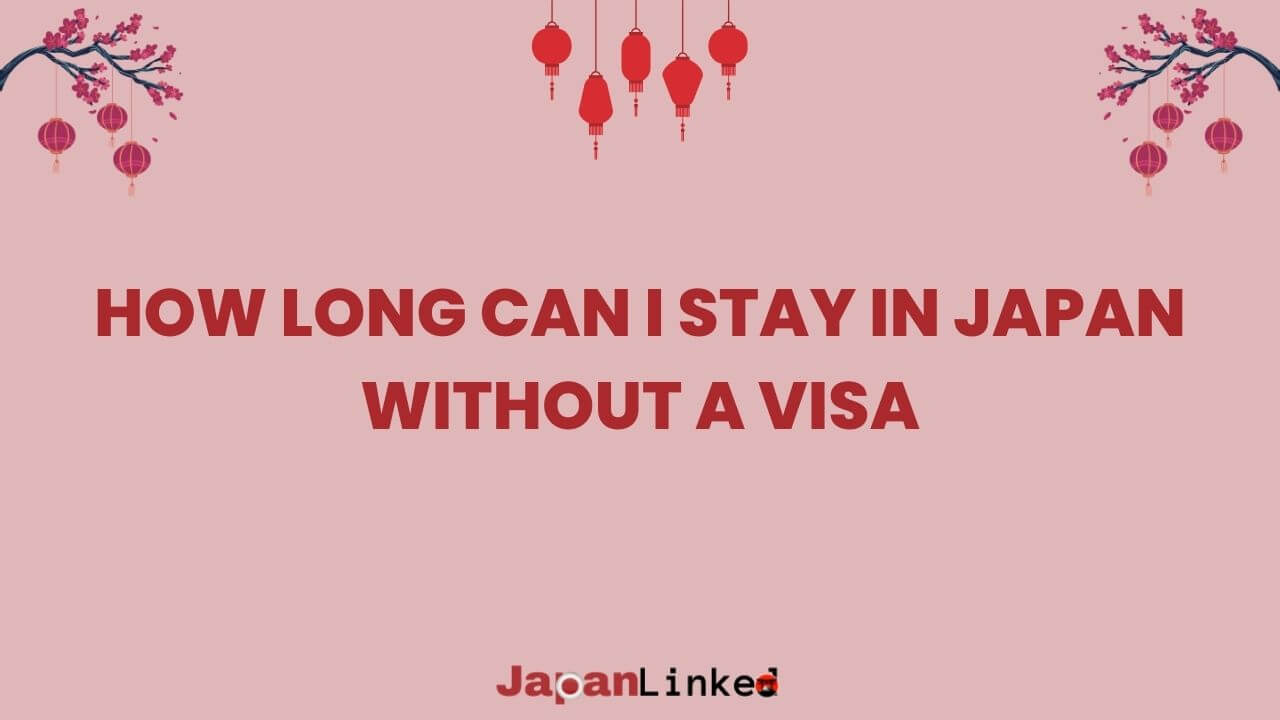Japan’s visa waiver program allows citizens from many countries to enter Japan without obtaining a visa in advance.
This program is designed to promote tourism and short-term business visits while simplifying the entry process for eligible travelers.
When you enter Japan under this program, you’re granted “Temporary Visitor” status, which is different from having an actual visa.
This status is stamped directly into your passport upon arrival after a brief immigration screening. The immigration officer will verify your eligibility and purpose of visit before granting entry.
The key difference between visa-free entry and having a visa lies in the application process and flexibility:
- Visa-free entry: No advance application required; status determined at the border
- Actual visa: Must be applied for and approved before travel; may allow longer stays or specific activities
To qualify for visa-free entry to Japan, you must meet several important requirements:
- Valid passport – Your passport must be valid for the duration of your intended stay
- Confirmed return or onward ticket – Proof that you plan to leave Japan
- Sufficient funds to support yourself during your stay
- Clean immigration record with no previous deportations from Japan
- Legitimate purpose of visit (tourism, business meetings, visiting friends/family)
Immigration officers have the authority to deny entry even if your country participates in the visa waiver program. They may ask about your travel plans, accommodation arrangements, or financial resources to ensure you’re a genuine temporary visitor.
Important: Visa-free entry is not guaranteed. The final decision rests with immigration officials at your port of entry.
The visa waiver program offers convenience but comes with strict limitations on the length of stay and permitted activities. Understanding these rules is essential to avoid complications during your visit to Japan.
Visa-Free Stay Duration by Nationality
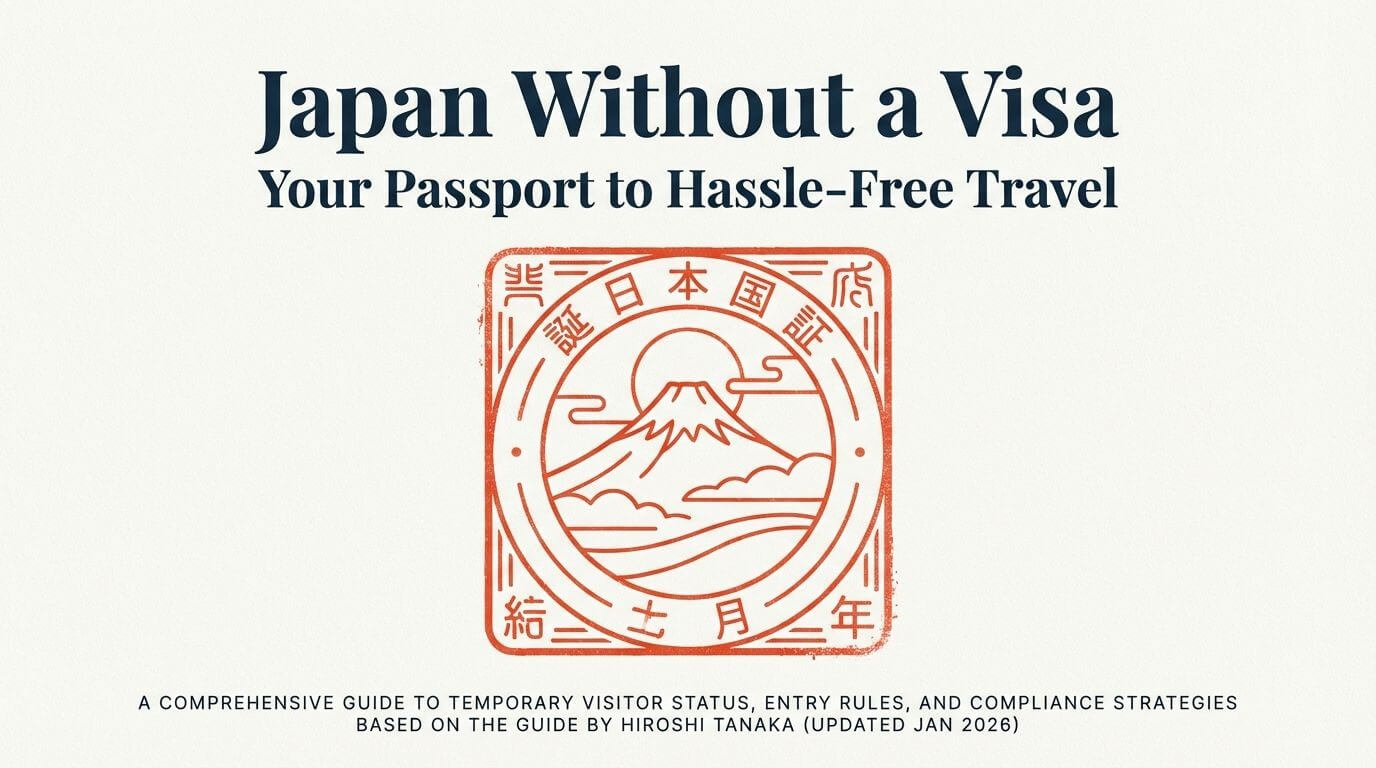
Japan’s visa exemption arrangements vary significantly depending on your nationality. While many countries enjoy a generous 90-day period, others have shorter durations or special conditions attached to their visa-free privileges.
Countries Eligible for 90-Day Visa-Free Stays
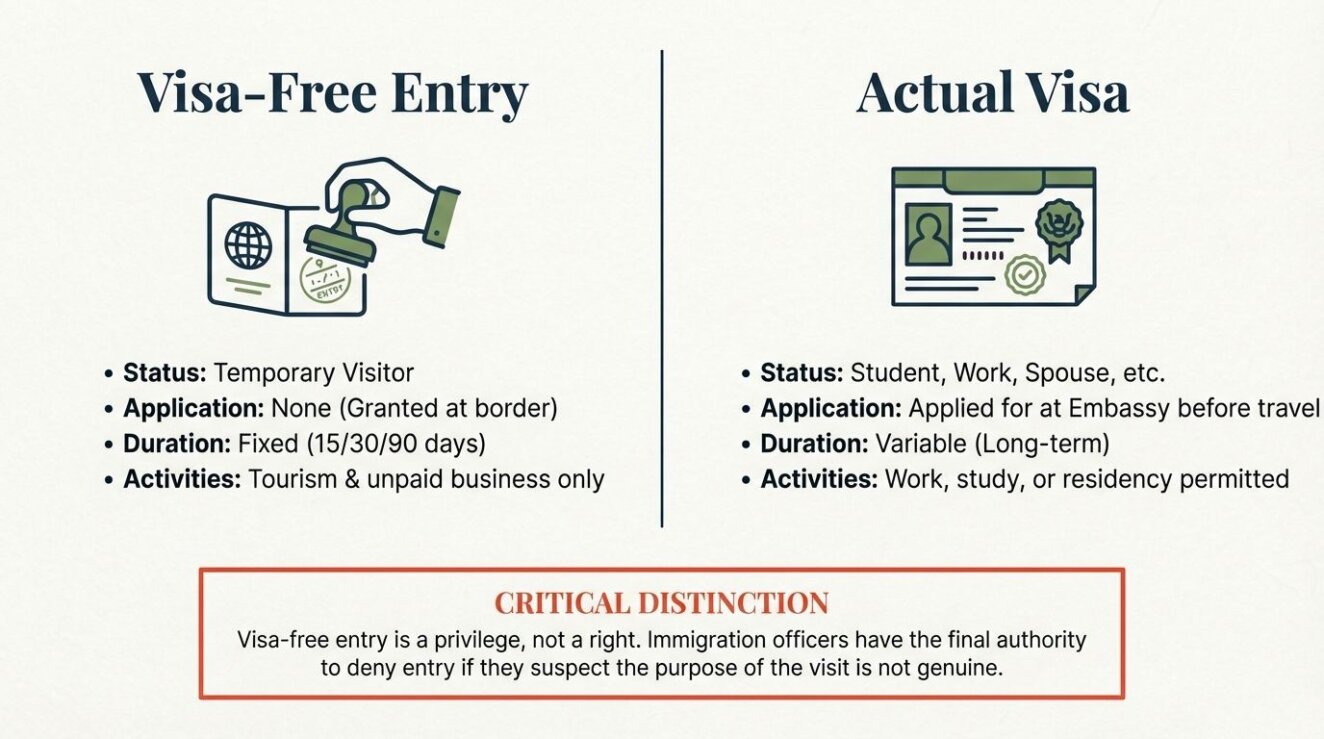
Most Western countries and several Asian nations benefit from Japan’s most generous visa-free arrangement, allowing visits of up to 90 consecutive days as “Temporary Visitors.” Citizens of the following countries can stay in Japan for up to 90 days without a visa:
| Region | Countries |
|---|---|
| North America | United States, Canada |
| Europe | All EU member states, United Kingdom, Switzerland, Norway, Iceland, Liechtenstein, Andorra, Monaco, San Marino |
| Asia | South Korea, Taiwan, Hong Kong, Macao, Singapore, Brunei* |
| Oceania | Australia, New Zealand |
| South America | Argentina, Chile, Costa Rica, Uruguay |
| Middle East | Israel |
*Brunei citizens with diplomatic or official passports receive 90 days; ordinary passport holders receive 30 days
Upon arrival, immigration officers will stamp your passport with a “Temporary Visitor” status, which permits activities like tourism, visiting friends or family, attending business meetings, or participating in cultural exchanges.
Countries with Shorter Visa-Free Stays
Not all countries receive the full 90-day exemption. Several nations have shorter permitted stays:
30-Day Visa-Free Stay Countries:
- Brunei (ordinary passport holders)
- Indonesia (for e-passport holders only)
- Qatar
- United Arab Emirates
15-Day Visa-Free Stay Countries:
- Thailand
- Malaysia
- Tunisia
These shorter durations cannot be extended while in Japan without exceptional circumstances, so travelers from these countries should plan their itineraries accordingly.
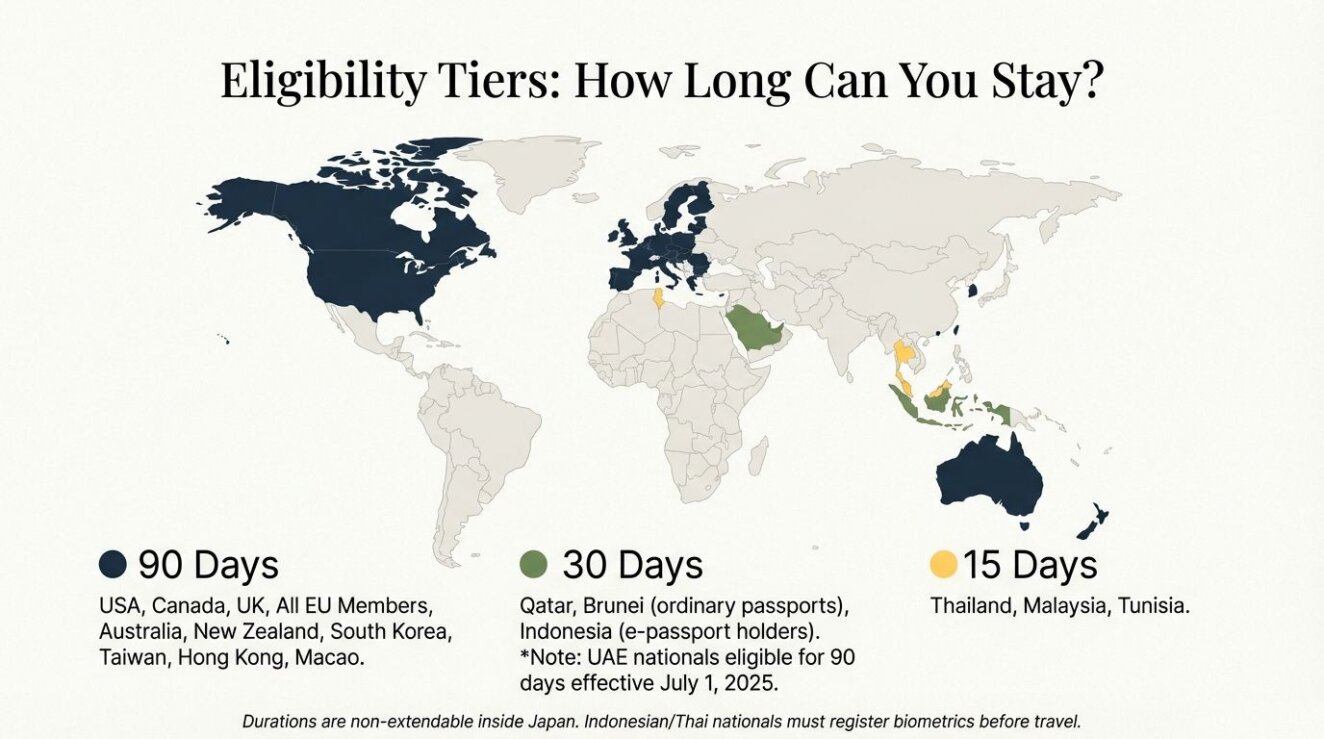
Recent and Upcoming Changes to Visa Exemptions
Japan periodically reviews and updates its visa exemption arrangements. Some notable recent and upcoming changes include:
- UAE nationals: Will be eligible for 90-day visa-free stays starting July 1, 2025 (currently 30 days)
- Indonesian e-passport holders: Visa requirement was waived in recent years, granting 30-day stays
- Chinese nationals with specific qualifications: Japan has introduced limited visa exemptions for certain Chinese citizens with high income levels or multiple previous visits
Important: Visa policies can change with little notice, especially during global events or diplomatic developments. Always check the latest information from official sources before planning your trip.
Special Conditions and Considerations
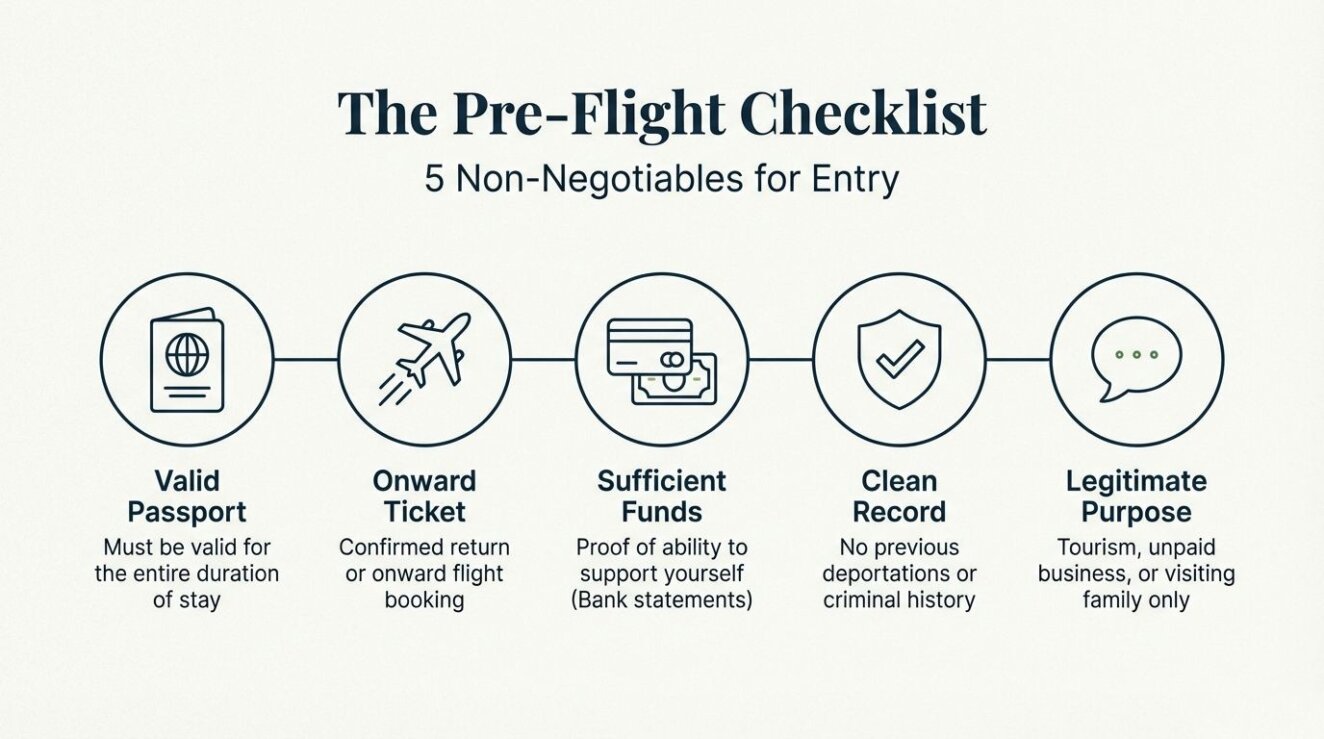
Some nationalities face additional requirements or special conditions for visa-free entry:
- Indonesian and Thai nationals must register their biometric information (fingerprints) with their respective immigration authorities before traveling to Japan under the visa exemption program.
- Taiwan residents must have their national ID number printed on their passport or carry a Taiwan Identity Card to qualify for visa-free entry.
- Russian nationals from certain regions participating in special bilateral agreements may qualify for simplified visa procedures, though not full visa exemption.
- Philippine nationals with AJCEP (ASEAN-Japan Comprehensive Economic Partnership) multiple-entry visas may qualify for simplified entry procedures.
The visa-free period begins on the day after your arrival in Japan and ends on the day you depart. This means if you arrive on January 1st with a 90-day exemption, you must leave by April 1st at the latest.
What You Can and Cannot Do During a Visa-Free Stay
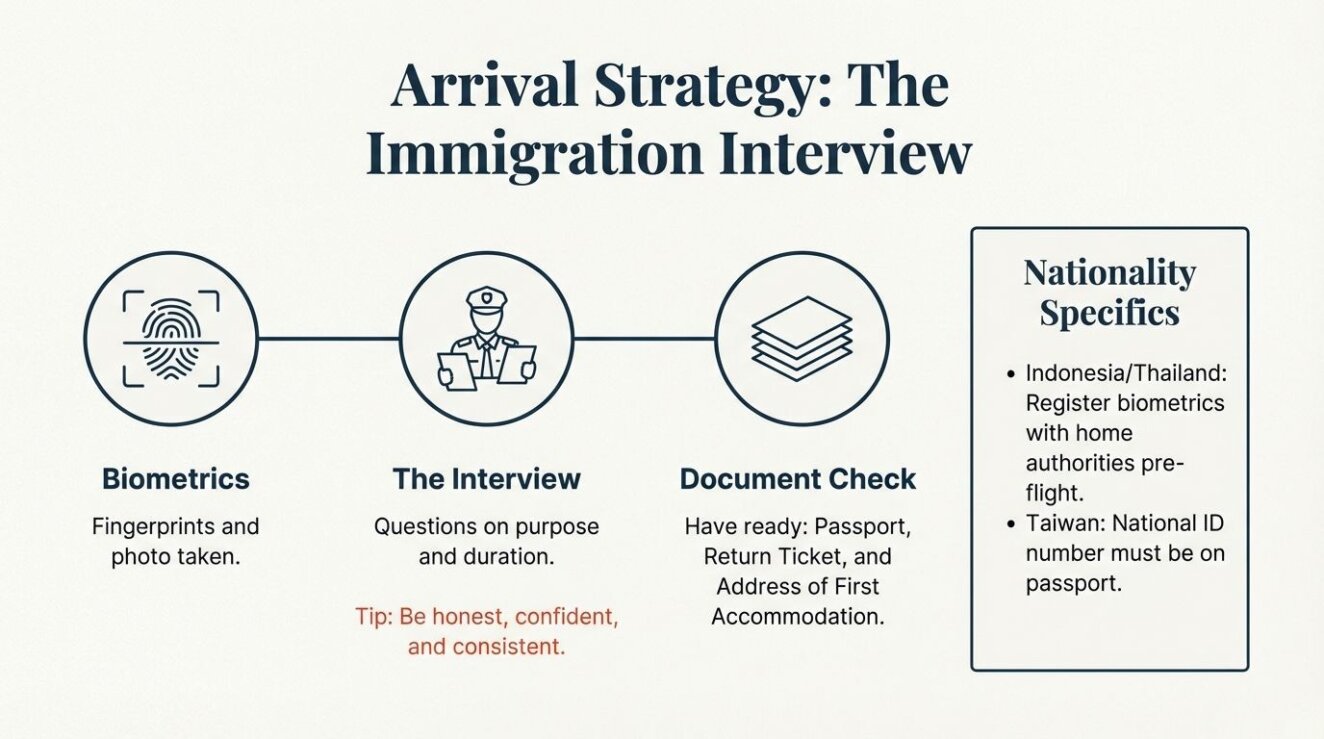
When entering Japan on a visa-free “Temporary Visitor” status, understanding what activities are permitted and prohibited is crucial to avoid violating immigration laws. The Japanese government has specific rules about how visitors can spend their time in the country.
Permitted Activities
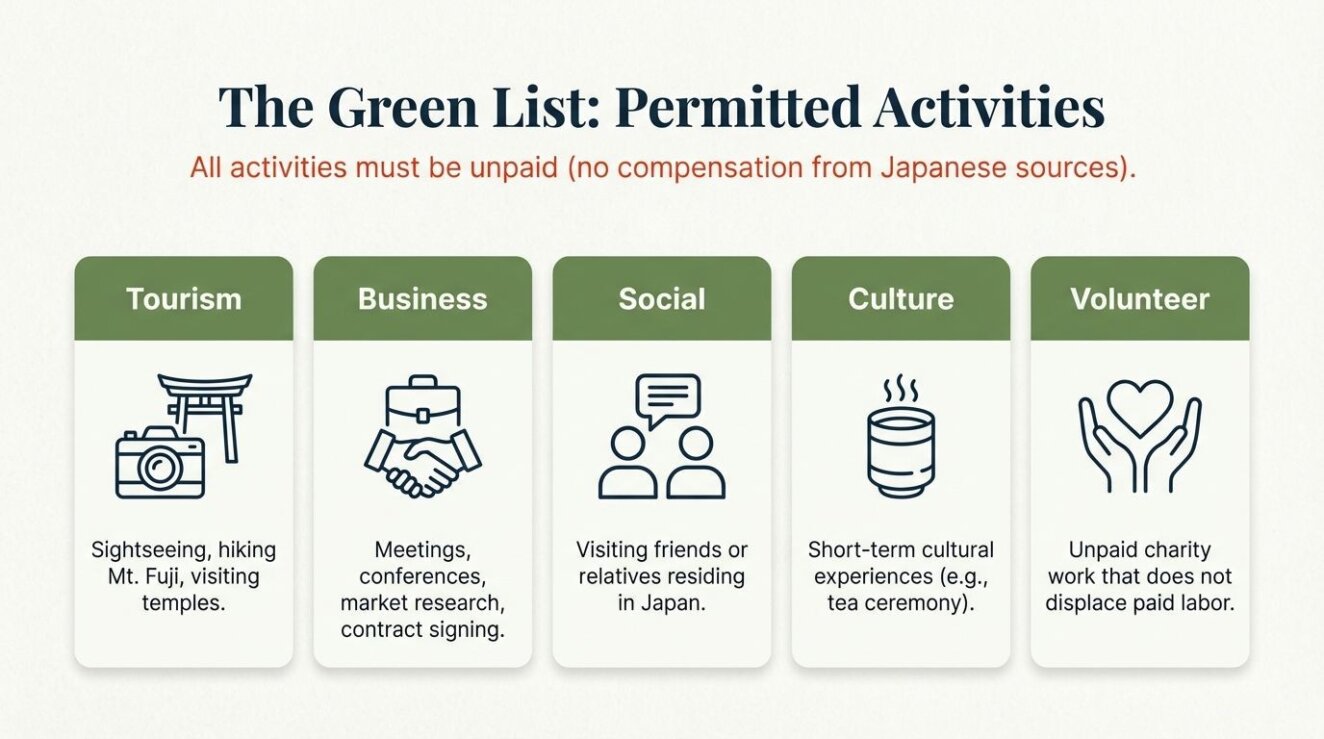
While in Japan on a visa-free stay, you are allowed to engage in:
- Tourism and sightseeing — Exploring temples in Kyoto, hiking Mount Fuji, or enjoying Tokyo’s neighborhoods
- Business meetings and conferences — Attending conferences, meeting clients, or exploring business opportunities (without receiving compensation from Japanese sources)
- Visiting friends and family — Staying with or visiting relatives or friends residing in Japan
- Short-term study activities — Participating in brief cultural experiences like tea ceremony classes or language immersion programs (not formal educational programs)
- Volunteer activities — Engaging in unpaid volunteer work that doesn’t displace paid positions
Prohibited Activities
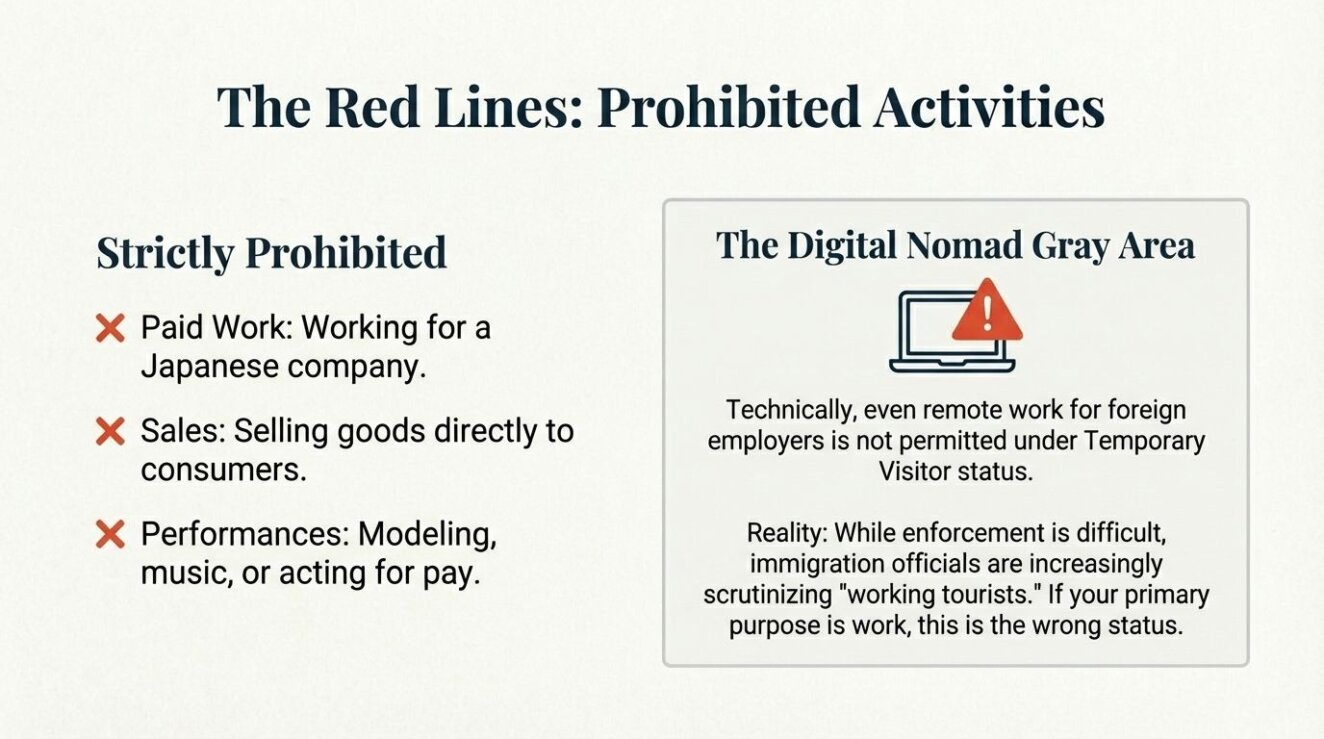
The following activities are strictly prohibited during a visa-free stay:
- Any form of paid work — Whether for Japanese companies or remote foreign employers
- Engaging in performance for compensation — Including paid musical performances, modeling, or acting
- Starting or operating a business in Japan
- Selling goods or services directly to Japanese consumers
- Enrolling in formal educational programs requiring a student visa
Remote Work: A Gray Area
Remote work has become a particularly confusing topic for international travelers. Here’s what you need to know:
“Technically, even remote work for foreign employers while physically in Japan on a temporary visitor status is not permitted under Japanese immigration law.”
While enforcement can be difficult, immigration officials are increasingly aware of digital nomads and may question your activities if they suspect you’re working during your stay.
If you need to work remotely while in Japan, you should consider applying for an appropriate visa rather than relying on visa-free entry.
Documentation Requirements During Your Stay
While in Japan, you must:
- Carry your passport at all times — Japanese law requires foreigners to have their passport with valid entry stamp/sticker accessible
- Keep proof of onward travel — Airlines may request this before boarding, and immigration officials may ask upon arrival
- Maintain evidence of sufficient funds — While rarely checked after entry, having access to funds for your entire stay is required
- Register your accommodation — Hotels handle this automatically, but if staying with friends, they must register your stay with local authorities
| Documentation | Required When | Notes |
|---|---|---|
| Passport | At all times | Must be valid for duration of stay |
| Proof of onward travel | Upon entry | Return/onward ticket |
| Financial proof | Upon request | Bank statements, credit cards |
| Accommodation details | Throughout stay | Address where you’re staying |
Special Considerations for Business Travelers
Business travelers on visa-free entry should be particularly careful about:
- Meeting agendas — Having clear documentation about the purpose of business meetings
- Business cards — Carrying cards showing employment by a non-Japanese company
- Invitation letters — Letters from Japanese companies you’re visiting can help clarify your purpose
Remember that the primary purpose of visa-free entry is for temporary visits, not for establishing any long-term presence or economic activity in Japan.
When in doubt about whether your planned activities are permitted, it’s always best to consult with a Japanese embassy or consulate before your trip.
The ‘Visa Run’ Myth and Re-entry Rules
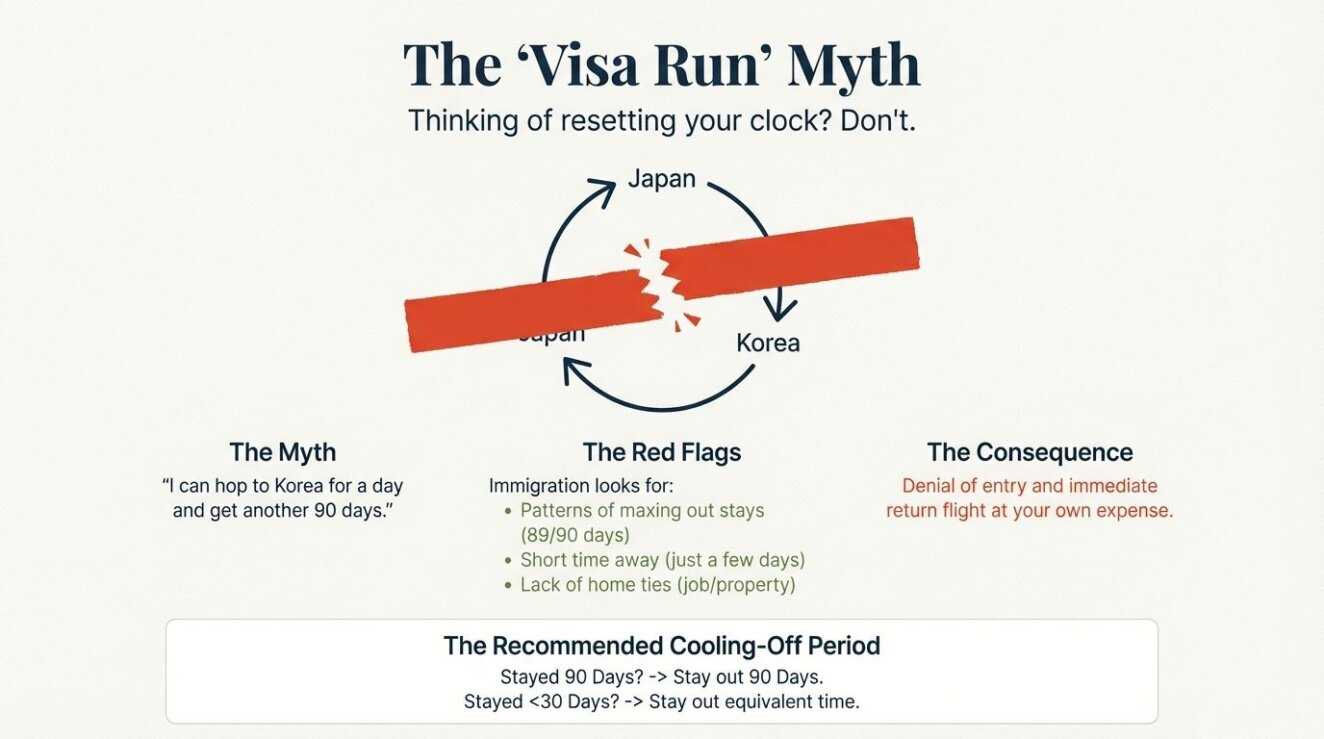
Many travelers have heard of the concept of a “visa run” – the practice of leaving a country temporarily and returning immediately to reset your visa-free stay period. While this might work in some countries, Japan takes a firm stance against this practice.
What Exactly Is a “Visa Run”?
A visa run typically involves:
- Staying in Japan for the maximum allowed period (usually 90 days)
- Taking a short trip to a neighboring country like South Korea or Taiwan
- Attempting to re-enter Japan immediately for another visa-free period
This practice is often attempted by those hoping to stay in Japan long-term without obtaining the appropriate visa. However, Japanese immigration authorities are well aware of this strategy and actively work to prevent it.
Japan’s Official Stance on Consecutive Entries
The Japanese Immigration Bureau doesn’t publish specific rules about how long you must wait between visa-free entries.
However, immigration officers have considerable discretion when deciding whether to allow you entry. Their primary concern is whether you’re trying to use consecutive tourist entries to effectively live in Japan.
Immigration officers look for patterns that suggest you’re attempting to circumvent visa regulations. If they suspect you’re using visa runs to live in Japan long-term, they can and will deny you entry.
Red Flags That Trigger Immigration Scrutiny
When re-entering Japan after a short absence, immigration officers may become suspicious if:
- Your previous stay was close to the maximum limit (e.g., 80-90 days)
- You’ve made multiple entries within a short timeframe (e.g., 3 entries in 6 months)
- Your time outside Japan was very brief (just a few days)
- You have no clear ties to your home country (job, property, family)
- You lack sufficient funds to support yourself as a genuine tourist
- You have no clear itinerary or purpose for your visit
- Your passport shows a pattern of leaving just before the 90-day limit
The Unwritten “Cooling-Off Period”
While not officially codified, experienced travelers and immigration experts often recommend a “cooling-off period” between visa-free stays in Japan:
| Previous Stay Duration | Recommended Time Outside Japan |
|---|---|
| 90 days (full period) | At least 90 days |
| 60-89 days | At least 60 days |
| 30-59 days | At least 30 days |
| Less than 30 days | At least equal to your stay |
Remember: These are not official rules but guidelines based on observed patterns of immigration decisions. Each entry is assessed individually.
Real Consequences of Attempted Visa Runs
The penalties for attempting to circumvent Japan’s immigration rules can be severe:
- Immediate denial of entry at the airport immigration checkpoint
- Questioning and detention while your case is reviewed
- Being issued a reentry ban (typically 1-5 years, or even longer)
- Having a permanent record with Japanese immigration that may affect future visa applications
- Deportation at your own expense if you’re found to be abusing the system
One particularly serious consequence is being flagged in Japan’s immigration database. This can lead to increased scrutiny or automatic rejection on all future entry attempts, even years later.
The Legal Alternative
Instead of risking a visa run, consider applying for the appropriate visa for your intended stay:
- Student visas for language school or university study
- Work visas for employment opportunities
- Working holiday visas for eligible nationalities
- Specified skilled worker visas for certain professions
- Highly skilled professional visas for qualified individuals
The bottom line: Japan’s immigration system is designed to welcome genuine tourists and visitors, not to accommodate those looking to live in Japan without proper documentation. Respect the rules, and you’ll enjoy a much smoother experience with Japanese immigration.
Consequences of Overstaying Your Visa-Free Period
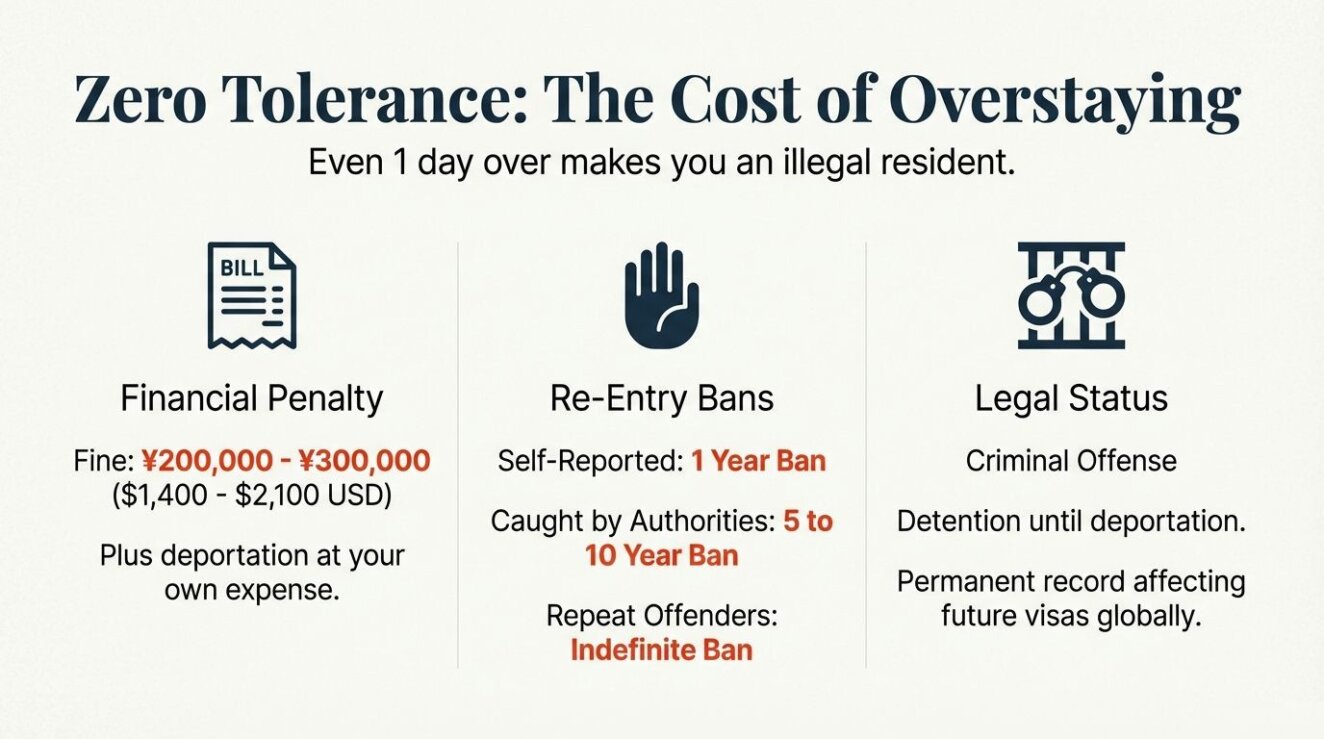
Staying in Japan beyond your permitted period is not merely frowned upon—it’s a serious violation of Japanese immigration law with far-reaching consequences.
Japan’s immigration authorities maintain meticulous records and have become increasingly strict in enforcing these regulations.
Legal Penalties for Overstaying
When you overstay your permitted period in Japan—even by a single day—you immediately become an illegal resident under Japanese law. This status triggers a series of legal consequences that can significantly impact your current stay and future travel plans.
The Japanese Immigration Control and Refugee Recognition Act clearly outlines the penalties for overstaying:
- Criminal offense: Overstaying is classified as a criminal immigration violation
- Mandatory deportation proceedings: All overstayers are subject to removal from Japan
- Permanent record: The violation is recorded in Japan’s immigration database
- Potential detention: Overstayers may be held in immigration detention facilities
Detention and Deportation Process
If you’re caught overstaying, the process typically unfolds as follows:
- Initial detention: You’ll be taken to an immigration facility for processing
- Investigation: Officials will interview you to determine the circumstances of your overstay
- Deportation order: A formal deportation order will be issued
- Detention period: You may remain in detention until your deportation is arranged
- Forced departure: You’ll be required to leave Japan on a specified date
The detention facilities in Japan are not designed for comfort. You may be housed in a shared room with limited personal space, restricted communication with the outside world, and few amenities.
Detention periods can range from several days to months, depending on your case complexity and flight arrangements.
“The detention experience is particularly challenging because you have no control over when you’ll be released. Your passport is confiscated, and you’re completely at the mercy of the immigration system.”
Financial Penalties
Overstaying in Japan comes with significant financial consequences:
| Penalty Type | Amount/Impact |
|---|---|
| Administrative fine | ¥200,000-¥300,000 ($1,400-$2,100 USD) |
| Deportation costs | You must cover your own airfare |
| Legal representation | If needed, typically ¥300,000+ ($2,100+ USD) |
| Lost accommodation deposits | Non-refundable due to unexpected departure |
| Income loss | Unable to work during detention |
These financial burdens come at a time when you’re already dealing with the stress of detention and deportation, making a difficult situation even more challenging.
Re-entry Bans
Perhaps the most significant long-term consequence of overstaying is the re-entry ban imposed on deportees:
- 1-5 year ban: For cooperative overstayers who voluntarily report to immigration
- 5-10 year ban: For those caught by immigration officers or police
- Indefinite ban: For serious cases or repeat offenders
The duration of your ban typically correlates with the length of your overstay:
- Overstay of less than 3 months: Typically results in a 1-year ban
- Overstay of 3 months to 1 year: Usually leads to a 5-year ban
- Overstay exceeding 1 year: Can result in a 10-year or permanent ban
Long-term Impact on Future Visa Applications
Even after your re-entry ban expires, the overstay remains permanently on your immigration record and can affect:
- Future visa applications to Japan: Your previous overstay will be flagged during application review, leading to heightened scrutiny and possible denial
- Entry to other countries: Many nations share immigration data, and an overstay in Japan may trigger additional questioning or visa denials elsewhere
- Background checks: Some employment and education opportunities require clean immigration records
- Naturalization prospects: If you ever wish to become a permanent resident or citizen of Japan, a past overstay can be disqualifying
The “Special Permission to Stay” exception is rarely granted and typically only applies to those with strong humanitarian grounds, such as:
- Marriage to a Japanese national
- Having Japanese children who depend on you
- Serious medical conditions that cannot be treated in your home country
Even in these cases, approval is at the discretion of the Minister of Justice and is never guaranteed.
The Japanese immigration system prioritizes compliance and offers little leniency for those who disregard visa regulations.
The best strategy is always to respect the terms of your permitted stay and make proper arrangements if you wish to remain in Japan longer.
Options for Extending Your Stay Legally
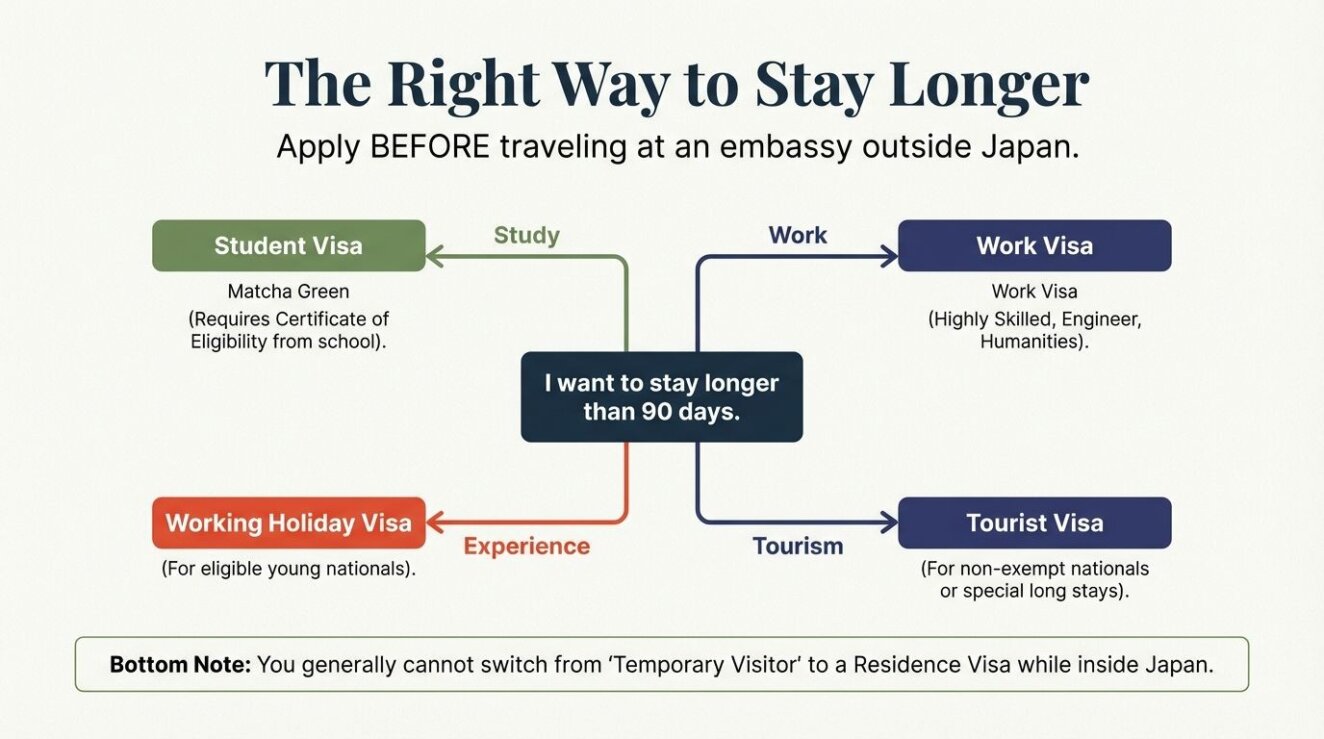
If you’re planning to stay in Japan beyond the visa-free period allowed for your nationality, you’ll need to obtain the appropriate visa before arriving in the country.
Japan offers several visa categories for longer stays, each designed for specific purposes and with different requirements.
Tourist Visa Options
While many travelers can enter Japan visa-free, those needing to stay longer or coming from countries without visa exemption agreements can apply for a tourist visa (officially called a “Temporary Visitor Visa”). These typically allow stays of 15, 30, or 90 days depending on your nationality and specific circumstances.
Required documentation for tourist visas:
- Valid passport
- Completed visa application form
- Recent photograph (4.5cm × 3.5cm)
- Detailed itinerary in Japan
- Proof of sufficient funds
- Flight reservation details
- Hotel reservations or accommodation arrangements
- Letter of guarantee (in some cases)
Business Visa Options
For those visiting Japan for business meetings, conferences, contract signings, or market research, a business visa is appropriate. These are also classified under “Temporary Visitor Visa” but with business activities specified.
Additional documentation for business visas:
- Letter of invitation from a Japanese company
- Business itinerary
- Company registration documents
- Letter explaining the purpose of your visit
Student Visa Options
If you’re planning to study in Japan for more than three months, a student visa is necessary. This applies to language schools, universities, vocational schools, and other educational institutions.
Key requirements for student visas:
- Certificate of Eligibility (applied for by your school in Japan)
- Acceptance letter from a Japanese educational institution
- Proof of financial support for your studies
- Academic transcripts and diplomas
- Study plan
Work Visa Options
Japan offers various categories of work visas based on your profession and qualifications. Some common categories include:
- Highly Skilled Professional Visa: For professionals with advanced degrees or specialized skills
- Specialist in Humanities/International Services: For English teachers, translators, and office workers
- Engineer/Specialist in Humanities/International Services: For IT professionals, engineers, and other technical roles
- Designated Activities: For specific activities like working holidays or internships
Long-Term Stay Visa Options
For those with family connections to Japan or planning to settle:
- Spouse or Child of Japanese National: For those married to Japanese citizens
- Long-Term Resident: For those with special connections to Japan
- Highly Skilled Professional: Points-based system for skilled workers
Application Process
- Determine the appropriate visa category based on your purpose of stay
- Gather the required documentation specific to your visa type
- Submit your application at the nearest Japanese embassy or consulate in your home country
- Wait for processing (typically 5-10 business days, though some visas take longer)
- Collect your visa once approved
Processing Times and Costs
| Visa Type | Typical Processing Time | Average Cost |
|---|---|---|
| Tourist/Business | 5-7 business days | $30-60 USD |
| Student | 2-4 weeks | $30-60 USD |
| Work | 1-3 months total* | $30-60 USD |
| Spouse/Long-term | 1-3 months total* | $30-60 USD |
*Note: Work and long-term visas typically require a Certificate of Eligibility (COE) to be obtained first, which can take 1-3 months, followed by the actual visa processing of 5-7 days.
When and Where to Apply
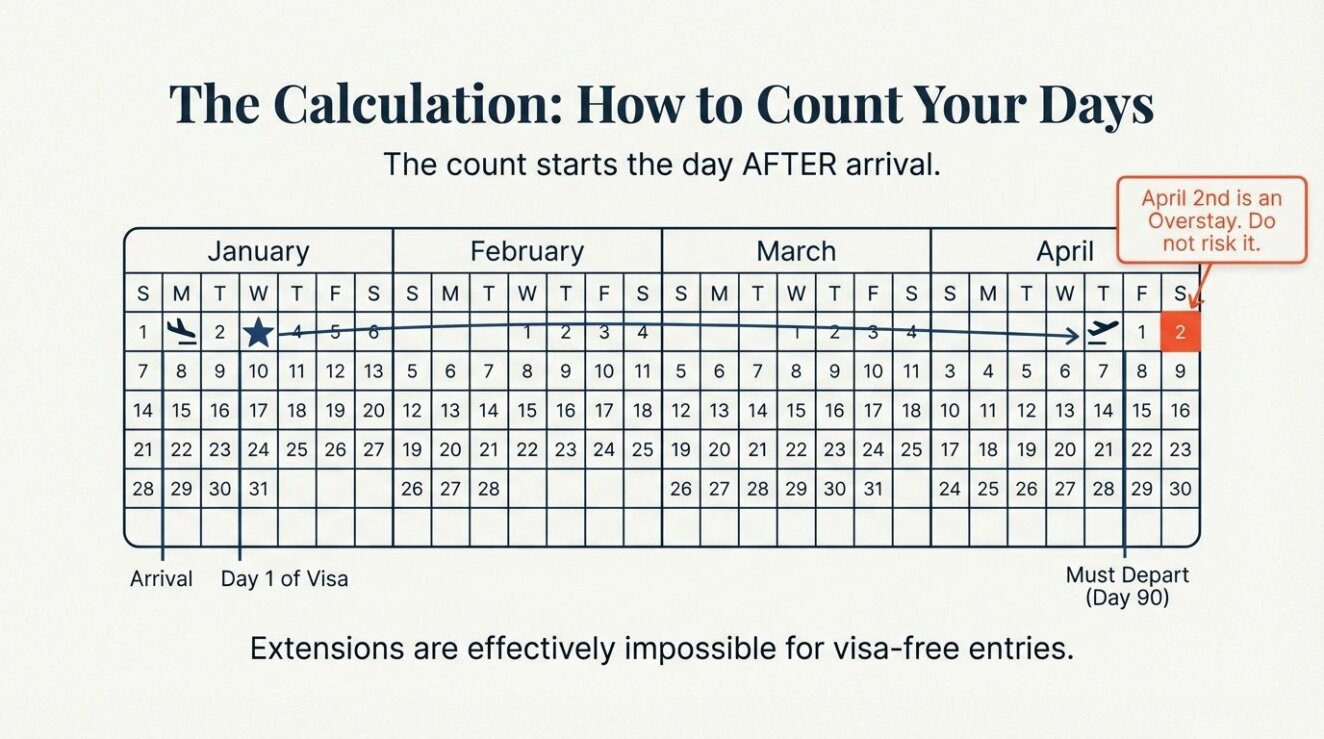
The golden rule for Japanese visa applications is to apply before you travel. Unlike some countries, Japan does not allow visitors to change their status from “temporary visitor” to another visa category while in the country without exceptional circumstances.
Where to apply:
- The Japanese embassy or consulate in your country of residence
- You must apply in person or through an accredited visa agency (varies by country)
- Applications cannot be submitted within Japan if you entered on a visa-free status
When to apply:
- Tourist/Business: 2-4 weeks before planned travel
- Student: 3-6 months before semester starts
- Work/Long-term: 4-6 months before intended move
Important: If you’re already in Japan on a visa-free stay, you generally cannot extend it or change to another visa status without leaving the country. Plan accordingly and apply for the appropriate visa before your trip if you anticipate needing more time.
By securing the right visa before your trip, you’ll ensure a stress-free, legal stay in Japan without worrying about immigration issues or having to cut your visit short.
Tips for a Smooth Entry and Stay in Japan
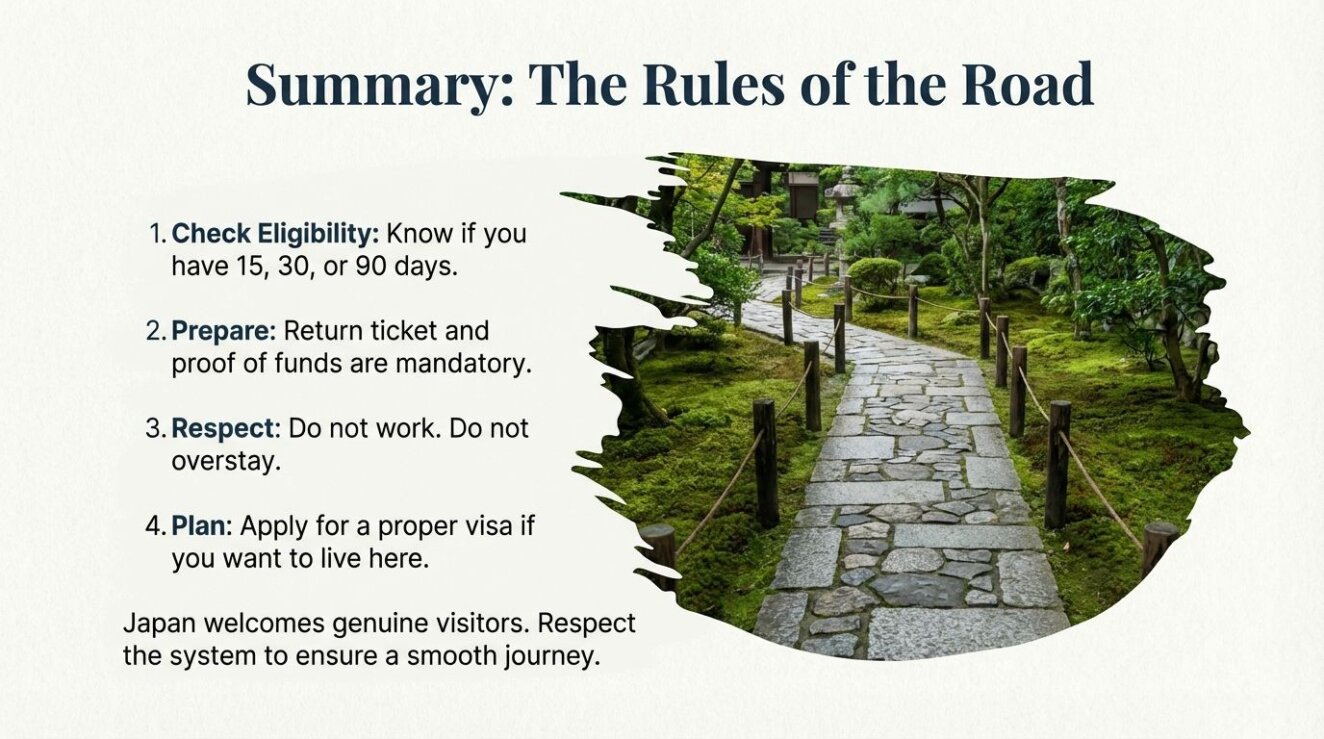
Entering Japan smoothly requires preparation beyond simply having a valid passport. Immigration officers have the final say on your entry, and being prepared can make the difference between a seamless arrival and unexpected complications.
Immigration Interview Preparation
When arriving in Japan, you’ll undergo a brief immigration interview. While typically straightforward, being prepared can prevent unnecessary delays:
- Practice answering basic questions about your visit purpose, accommodation plans, and departure date
- Maintain confidence and clarity when speaking with immigration officers
- Be honest about your intentions – officers are trained to detect inconsistencies
- Prepare a simple explanation of your itinerary if asked
- Know the address of your first accommodation without needing to check your phone
Remember that immigration officers are primarily concerned with ensuring you don’t plan to work illegally or overstay. A confident, straightforward manner goes a long way.
Required Documentation
Always have these essential documents readily accessible when entering Japan:
| Essential Documents | Additional Helpful Documents |
|---|---|
| Valid passport (with at least 6 months validity) | Travel insurance certificate |
| Completed disembarkation card | Hotel reservations (printed) |
| Proof of onward travel (return ticket) | Invitation letter (if visiting friends/family) |
| Sufficient funds for your stay | Detailed itinerary |
| Customs declaration form | Bank statements (last 3 months) |
Pro tip: Keep digital copies of all important documents in cloud storage as a backup, but always have physical copies for immigration.
Accommodation and Itinerary Planning
Having a well-planned itinerary strengthens your entry case:
- Book at least your first few nights of accommodation before arrival
- Create a rough day-by-day itinerary of places you plan to visit
- Research transportation options between destinations
- Consider booking major attractions in advance during peak seasons
- Have a printed copy of your hotel reservations with contact information
Your plans don’t need to be set in stone, but demonstrating that you’ve thought through your visit shows you’re a genuine tourist.
Emergency Contact Information
Prepare for unexpected situations by:
- Registering with your country’s embassy in Japan before travel
- Saving emergency contacts in your phone and on paper:
- Your country’s embassy in Japan
- Local police (110)
- Ambulance/fire (119)
- Japan Visitor Hotline: 050-3816-2787 (available 24/7 in multiple languages)
- Sharing your itinerary with family or friends back home
- Noting the address and phone number of your accommodations
“The best travelers aren’t those who plan every minute of their trip, but those who plan for contingencies while leaving room for spontaneity.”
Resources for Staying Updated on Immigration Rules
Immigration policies can change, so stay informed through:
- The Japan National Tourism Organization (JNTO) website for visitor information
- Your country’s embassy in Japan for citizen-specific advisories
- The Immigration Services Agency of Japan for official policy updates
- Japan Visitor Hotline for real-time assistance and information
- Travel advisory services from your home country
Consider downloading the “Japan Official Travel App” which provides emergency updates, tourist information, and translation services.
By thoroughly preparing these aspects of your trip, you’ll minimize the chance of entry issues and ensure a smoother, more enjoyable stay in Japan without visa complications.
Special Situations and Exceptions
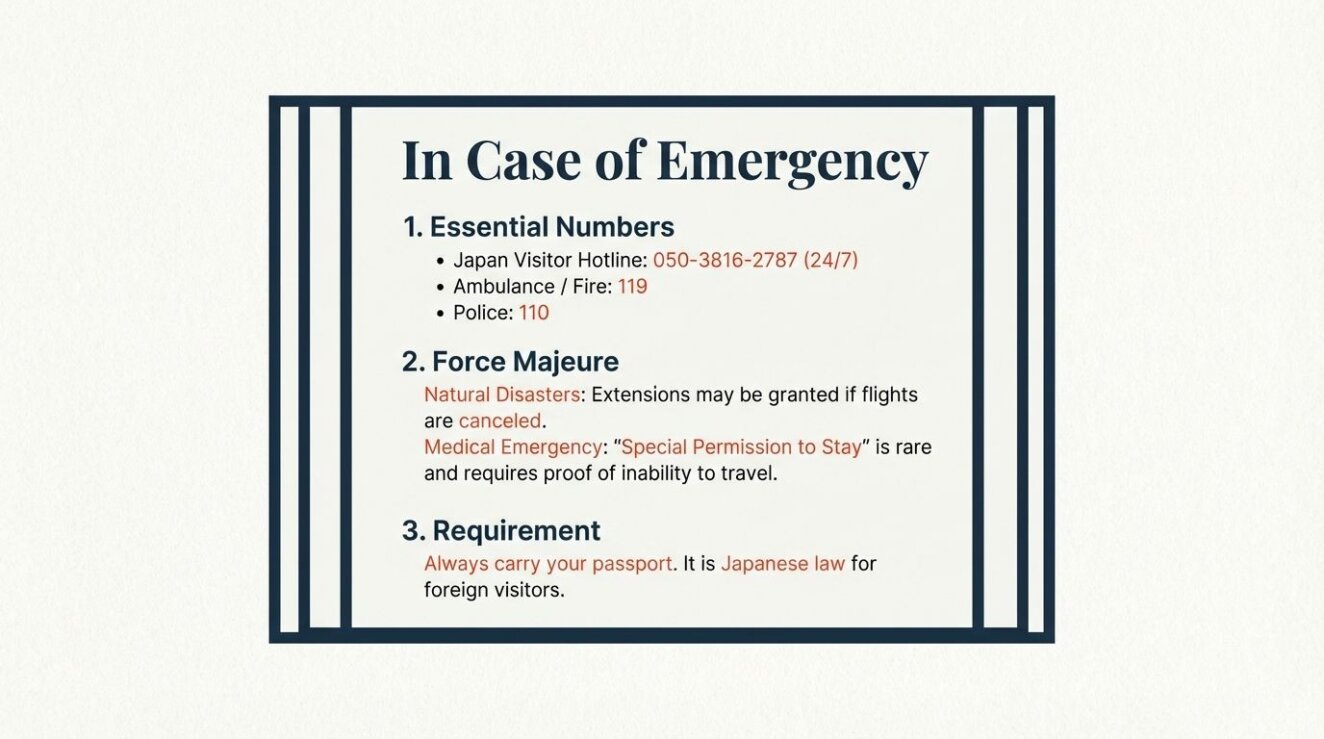
While Japan’s visa regulations are generally strict, certain exceptional circumstances may affect your stay duration or status. Understanding these special situations can help you navigate unexpected events during your time in Japan.
Medical Emergencies During Your Stay
If you experience a serious medical emergency while in Japan on a visa-free stay, you may be eligible for a Special Permission to Stay on humanitarian grounds. This is handled on a case-by-case basis and requires:
- Medical documentation from a Japanese hospital or doctor
- Proof that you’re unfit to travel
- A formal application to the Immigration Services Agency
Important: This permission is not automatically granted and depends on the severity of your condition. Always maintain comprehensive travel insurance that covers medical evacuation if needed.
Natural Disasters and Force Majeure
Japan is prone to natural disasters such as earthquakes, typhoons, and tsunamis. In cases of major disasters that disrupt transportation or create unsafe conditions:
- Immigration authorities may implement temporary measures allowing visitors to remain in the country
- Special extensions may be granted if international flights are canceled
- Emergency shelters often accept foreign visitors regardless of visa status
During the 2011 Tohoku earthquake and tsunami, for example, many foreign visitors received temporary extensions when flights were canceled or redirected.
COVID-19 and Health-Related Policy Changes
The pandemic demonstrated how health emergencies can impact immigration policies. During COVID-19, Japan:
- Implemented temporary visa extensions for those unable to return home
- Created special re-entry procedures for certain visa holders
- Established quarantine and testing requirements
While these specific measures have evolved, they illustrate how Japan may adapt policies during public health emergencies. Always check the latest health-related entry requirements before and during your stay.
Special Permits or Considerations
In certain situations, you may apply for special consideration:
| Type of Permit | Purpose | Application Process |
|---|---|---|
| Permission for Temporary Landing | For cruise passengers or transit travelers | Applied at port of entry |
| Landing Permission for Crew Members | For aircraft and ship crew | Through employer/carrier |
| Special Landing Permission for Designated Activities | For specific authorized activities | Through regional immigration bureau |
Who to Contact in Emergencies
If you encounter an emergency situation that may affect your visa status:
- Immigration Services Agency of Japan – For visa and stay-related inquiries
- Information Centers are available in major cities
- Foreign Residents Support Centers in Tokyo, Nagoya, Osaka, and Fukuoka
- Your Country’s Embassy or Consulate in Japan
- Can provide emergency assistance and guidance
- May liaise with Japanese authorities on your behalf
- Japan Visitor Hotline: 050-3816-2787
- Available 24/7 in English, Chinese, Korean, and Japanese
- Provides information and assistance for various emergencies
Pro Tip: Store emergency contact information offline on your phone and in a physical document. During major disasters, communication networks may be disrupted, making online searches difficult.
Remember that while exceptions exist, they’re not guaranteed. The best approach is to plan your trip within the standard visa-free duration and have contingency plans for unexpected situations.

